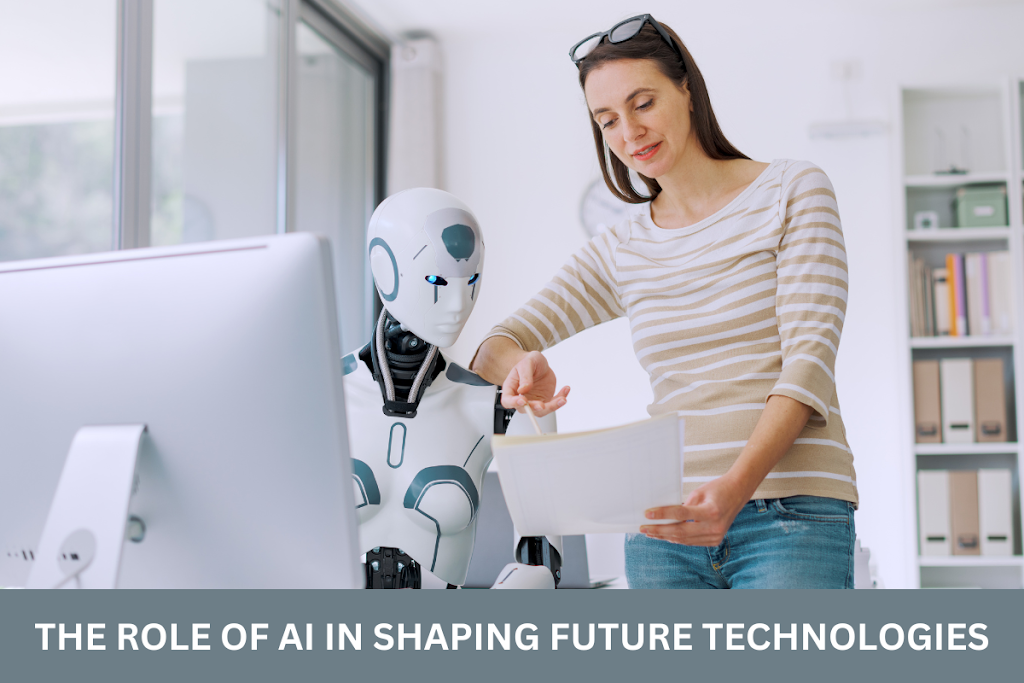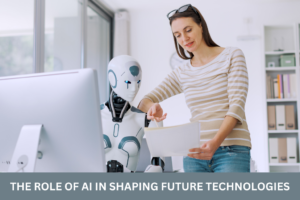THE ROLE OF AI IN SHAPING FUTURE TECHNOLOGIES
The Role of AI in Shaping Future Technologies is transforming industries by enhancing automation, decision-making, and innovation. Discover how AI is revolutionizing healthcare, finance, and more, paving the way for a smarter future!
Artificial Intelligence (AI) is no longer a futuristic concept; it has become an integral part of modern technology, transforming industries and reshaping the way we interact with the world. From automation to advanced data analysis, AI is revolutionizing multiple sectors, making systems smarter and more efficient. In this article, we will explore the role of AI in shaping future technologies and how it is driving innovation across various industries.
1. AI in Healthcare
The healthcare industry has seen remarkable advancements with the integration of AI. AI-powered diagnostic tools are enhancing the accuracy of medical imaging, detecting diseases such as cancer at an early stage. Machine learning algorithms can analyze vast amounts of medical data to predict patient outcomes and recommend personalized treatment plans. AI is also playing a crucial role in drug discovery, accelerating the development of new medications by simulating complex biochemical interactions.
2. AI in Autonomous Vehicles
Self-driving cars are one of the most anticipated AI-driven innovations. AI enables these vehicles to interpret data from sensors, cameras, and LiDAR to make real-time driving decisions. Companies like Tesla, Waymo, and Uber are investing heavily in AI to improve vehicle safety and navigation. AI-driven predictive maintenance in automobiles is also reducing operational costs and preventing accidents.
3. AI in Cybersecurity
With the rise of digital transformation, cybersecurity has become a critical concern. AI is helping businesses protect their data by identifying and neutralizing potential threats before they cause harm. Machine learning models can analyze patterns of cyberattacks and automatically respond to security breaches. AI-powered authentication methods, such as facial recognition and behavioral biometrics, are also enhancing digital security.
4. AI in Education
AI is transforming education by offering personalized learning experiences. Intelligent tutoring systems analyze students’ learning patterns and adjust teaching materials accordingly. AI chatbots provide instant assistance to students, answering queries and guiding them through their coursework. Additionally, AI-driven analytics help educators identify students who need additional support, ensuring a more effective learning environment.
5. AI in Finance and Banking
The financial sector is leveraging AI for fraud detection, risk assessment, and automated trading. AI algorithms analyze market trends in real-time, making high-frequency trading more efficient. Chatbots and virtual assistants in banking improve customer service by handling queries and transactions. AI-driven credit scoring systems assess loan applications with greater accuracy, reducing bias and enhancing financial inclusion.
6. AI in Smart Cities
Smart cities are using AI to optimize infrastructure and improve urban living. AI-powered traffic management systems reduce congestion and enhance road safety. Smart energy grids use AI to optimize electricity distribution, reducing energy waste. AI-enabled waste management systems track and manage garbage collection efficiently. These innovations contribute to sustainable urban development.
7. AI in Business and Customer Experience
Businesses are using AI to enhance customer experience and streamline operations. AI chatbots provide instant customer support, reducing response times. AI-driven analytics help businesses understand consumer behavior and make data-driven decisions. Automated inventory management and predictive analytics optimize supply chains, reducing operational costs.
8. AI in Entertainment and Content Creation
AI is transforming the entertainment industry by generating content, personalizing recommendations, and enhancing visual effects. Streaming services like Netflix and Spotify use AI to analyze user preferences and suggest content. AI-generated art, music, and deepfake technology are pushing the boundaries of creative expression. AI-driven video editing tools are making content creation more accessible.
Challenges and Ethical Concerns
Despite its advancements, AI poses challenges such as bias in algorithms, data privacy concerns, and job displacement due to automation. Ensuring ethical AI development is crucial to avoid negative societal impacts. Governments and organizations must implement regulations to balance innovation with responsible AI use.
Conclusion
AI is playing a transformative role in shaping future technologies across various sectors. From healthcare and cybersecurity to smart cities and entertainment, AI is driving innovation and efficiency. As AI continues to evolve, it is essential to address ethical concerns and develop responsible AI systems that benefit society as a whole. The future of technology is undoubtedly AI-driven, and embracing its potential will lead to groundbreaking advancements.






